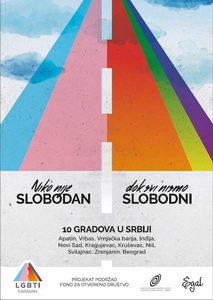 Author: Marko Lumo (Social Inclusion Blog)
Author: Marko Lumo (Social Inclusion Blog)
When speaking of the methods to be used to adequately promote the human rights of LGBTI persons, the first thing that comes to anyone’s mind (whether for or against) is Pride. (…)
Those better acquainted with this issue would certainly propose several other methods that could be used to work on improving the rights of members of the LGBTI community. Some were tried during past years with more or less success, some were not, and we can only hope that someone in the future makes proper use of them. What I did not expect at all (…) was something called “LGBTI Caravan”. Even now, I’m thinking about all the lights that went on in my head when my friend from the Egal organization told me that one of the activities the organization was planning for this year was precisely that. (…)
She said that activists in this organization realized that ever since people started talking about the rights of LGBTI persons in Serbia, the least talk of these issues was outside capital, and that events related to the promotion of the human rights of LGBTI persons are mostly located in Belgrade, occasionally Novi Sad and Niš. People in other towns outside the main urban centres are mostly introduced to these topics through media. (…) LGBTI persons also live in smaller towns and villages across Serbia. They, unfortunately, lack precisely this type of content – content that would inform and educate citizens, and show the members of the LGBTI community they are not alone and lonely in their difference and uniqueness. That there is support. (…)
“LGBTI Caravan” travelled through Serbia. Activists of the Egal organization visited ten towns across Serbia during the period 16 May – 8 June 2016: Apatin, Vrbas, Vrnjačka Banja, Inđija, Novi Sad, Kragujevac, Kruševac, Niš, Svilajnac, Zrenjanin, thus implementing the largest activity of this type at the local level in Serbia by a civil society organization focusing on the LGBTI community. Attendance was, as the organizers say, considerable. (…)
While we, as members of this community, can only hope that this event will live on in the future and see an advanced age, becoming larger, changing and transforming in accordance with the needs of the LGBTI community, as well as other citizens, yet retaining the initial goal of respecting the rights of all, regardless of sexual orientation and experience of gender identity, for “until we are all free, we are none of us free.”
The text in its entirety can be found on the Social Inclusion Blog.
 Government of the Republic of Serbia
Government of the Republic of Serbia















 pdf [271 KB]
pdf [271 KB]
Leave a Comment